|
SDO Reveals
The Solar
Dynamics Observatory is a satellite with a pro-grade (counterclockwise)
orbit around the Earth. Thus as the Earth turns during the day,
also in a pro-grade manner, the SDO satellite makes one circle
around the Earth. It keeps the Sun in view by having an
extremely tilted orbit path, an inclination of 28.05 degrees, so
the Earth does not block the view. As a geo-stationary
satellite, its Orbital Period is 1436.14 minutes, or the 24 hour
Earth day. Thus when the Earth’s Moon is in view, the Moon would
come into view from the West, moving toward the East, or in a
Left to Right direction.
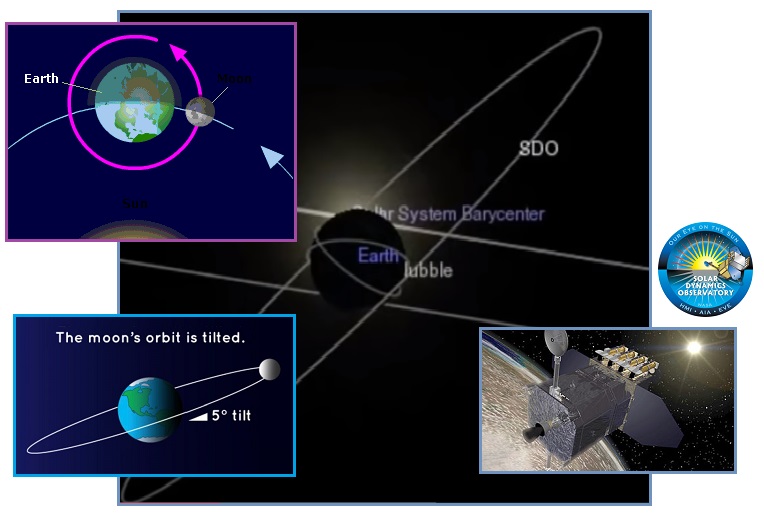
- Solar Dynamics Observatory
https://en.wikipedia.org/wiki/Solar_Dynamics_Observatory
- SDO is in an inclined
geosynchronous orbit around Earth. The ground station
consists of two dedicated 18-meter radio antennas in White
Sands Missile Range, New Mexico, constructed specifically
for SDO.
- Orbit of the Moon
https://en.wikipedia.org/wiki/Orbit_of_the_Moon
- The Moon orbits Earth in the
prograde direction and completes one revolution relative
to the stars in about 27.32 days (a sidereal month) and
one revolution relative to the Sun in about 29.53 days (a
synodic month).
On September 9, per the SDO video and images released by SDO,
an object moved across the face of the Sun twice,
hours apart, with many holes in the
NASA story that this object was the Moon. First, how did
the “Moon” jump back so it could
make a second pass later? Second, if this was an eclipse of the
Sun by the Moon, why was this not a scheduled eclipse? Third,
why is the “Moon” of different sizes in the two video captures?
Fourth, why did the extreme angle of the “Moon” change, so that
a criss-cross occurs on the face of the Sun during a 5 hour
passage of the SDO satellite? The Zetas explain.
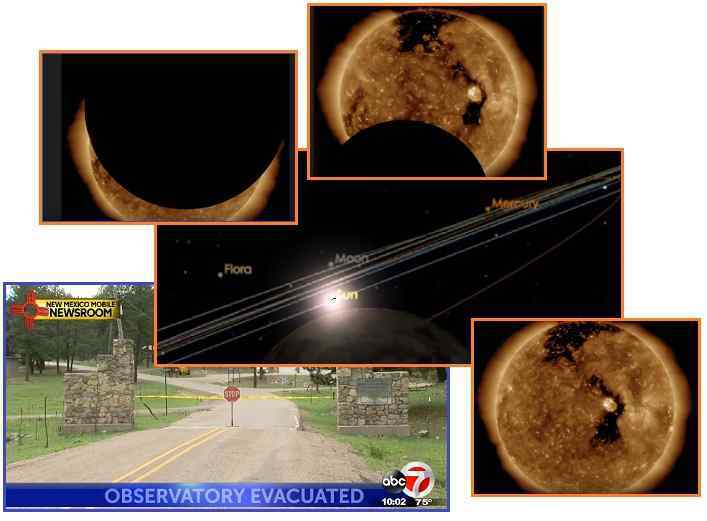
- NASA’s SDO Spots 2 Lunar Transits in
Space
September 9, 2018
https://www.nasa.gov/feature/goddard/2018/nasa-s-sdo-spots-2-lunar-transits-in-space
- On Sept. 9, 2018, NASA’s Solar
Dynamics Observatory, SDO, saw two lunar transits as the
Moon passed in front of the Sun. A transit happens when a
celestial body passes between a larger body and an
observer. This first lunar transit lasted one hour, from
4:30 pm to 5:30 p.m. EDT and obscured 92 percent of the
Sun at the peak of its journey. The second transit
happened several hours later at 9:52 p.m. and lasted a
total of 49 minutes, ending at 10:41 p.m. EDT. This
transit only obscured 34 percent of the Sun at its peak.
ZetaTalk Explanation
9/30/2018: How
did the supposed Moon move first one way across the Sun,
swooping across from upper left to lower right, and then
making another pass across the Sun from lower left to upper
right, during a space of only a few hours? Even presuming
NASA’s SDO satellite was moving at the time, this does not
account for the changes in direction nor the change in size of
the eclipsing object. Is this regularly recorded by the SDO
during New Moons? The motion is, however, precisely what would
happen if objects in a Moon Swirl were to pass in front of the
camera.
Nibiru is between the Earth
and Sun, within the orbit of Venus. Moon Swirls are composed
of a number of Moons, swirling in a circular manner around
each other, thus forming the long tubes often imaged by
amateur photographers using filters to bring out the Nibiru
complex in their captures. As we have detailed, from the start
of the ZetaTalk saga, the many moons of Nibiru are in a
perpetual dance with each other, constantly on the move. This
explains the swirling motion, the difference in size, and the
speed of the repeat eclipse of the Sun.
An eclipse by the Earth’s Moon
as seen from Earth seems to have the Moon the same size as the
Sun, though the Moon is eclipsing much more than the Sun
itself as much of the solar corona is likewise eclipsed. When
Venus passes in front of the Sun it is seen as a dot, though
Venus and the Earth are the same size and Venus is much larger
than the Moon. In such 2D images, proximity matters. The SDO
is taking a zoom of the Sun, to capture the details, and thus
anything in between the SDO satellite and the Sun are likewise
zoomed.
It was the sudden closing of the National Solar Observatory in
New Mexico on September 7th that got the media attention,
however. The National Solar Observatory is normally open to the
public, and shows the face of the Sun in real time, whereas the
SDO releases can be delayed and doctored. Suddenly the
observatory was swarmed by choppers and the FBI arrived, even
closing down the Post Office! Then in the following days, 6 more
real-time solar observatories were closed. What were they trying
to hide?
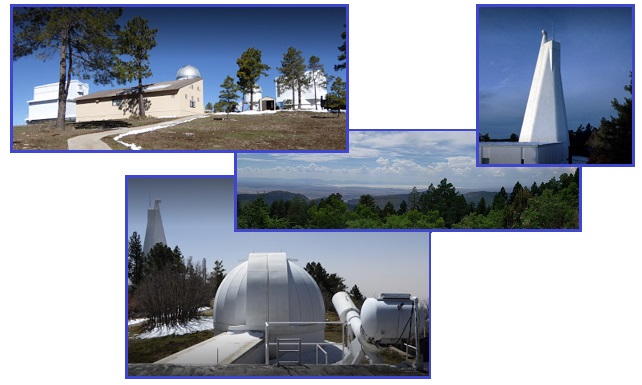
- Closure of National Solar Observatory
remains Shrouded in Secrecy
September 10, 2018
https://www.kvia.com/news/top-stories/closure-of-national-solar-observatory
- ABC-7 has confirmed the post
office in Sunspot will not be re-opened until further
notice, and cannot be re-opened until approved by local
law enforcement officials. ABC-7 Monday spoke with Shari
Lifson, who is with Aura, the company that co-manages the
Observatory with NMSU. Lifson told ABC 7 there is no
time-table for the Observatory to be re-opened. ABC-7 also
reached out the FBI, but did not hear back from the
federal agency in time for deadline. The FBI did speak
with local law enforcement about the length of the
observatory closure. The FBI did not tell Sheriff House
the reason for the closure.
- National Solar Observatory
Mysteriously Closed as Geomagnetic Storm Looms
September 11, 2018
https://www.zerohedge.com/news/2018-09-11/national-solar-observatory
- Just in case you were blowing off
the tin-foil-hat views of the observatory closure, we note
that all these solar/space cams down at the same time:
AXIS 232D Network Dome Camera located in Sydney Australia;
Webcams located at SOAR Observatory – The Southern
Astrophysical Research Telescope located in Chile; BRT
Tenerife Telescope Webcam located in Spain; Webcam located
at Mauna Kea observatory at the University of Hawaii Hilo;
Webcam from the Canada-France-Hawaii Telescope observatory
in Hawaii; Webcam at JAT OBservatory in Fairless Hills,
Pennsylvania.
ZetaTalk Explanation
9/30/2018: If
this eclipse by a Moon Swirl was captured and the film
released by the SDO on September 9, why was the New Mexico
solar observatory closed on September 7? NASA of course is
aware of Nibiru and its wafting Moon Swirls. Though the Moons
are never further from Nibiru than 5 million miles, Nibiru is
trending toward centering itself directly between the Earth
and the Sun. Thus NASA has been forced to restrict direct
public viewing, limiting the public to images that can be
doctored.
Retrograde Swirl
Where the Earth and the Earth’s Moon and the SDO all orbit in a
pro-grade (counterclockwise) manner, as do the Sun and all the
planets in the Solar System, Nibiru is retrograde. Nibiru
assumes a retrograde orbit during its passage of the Sun, and
rotates in a retrograde manner. The Moon Swirls dragged along
behind Nibiru likewise swirl in a retrograde manner. Thus, in
the SDO view, objects in a long Moon Swirl tube would be seen in
a retrograde motion, clockwise, left
to right. This was true of both the objects in the
September 9th SDO videos. A retrograde swirl, as the ancients
reported.
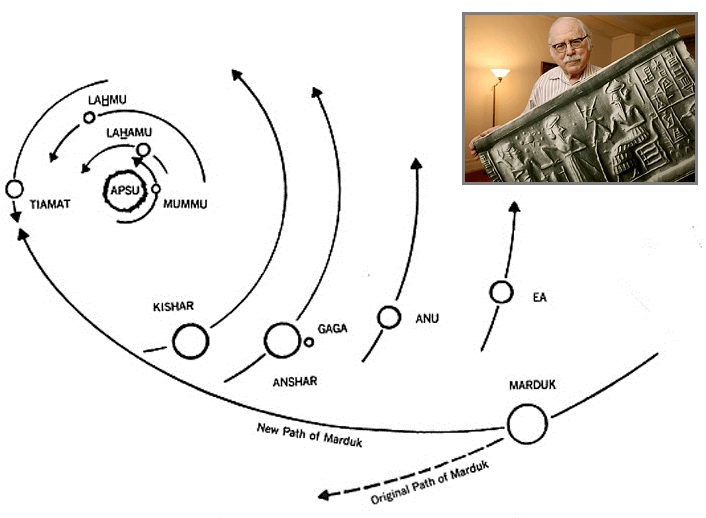
ZetaTalk Explanation 1/15/1997: As
the sweeping arm of this energy field passes the Nibiru, which
in no way could stay ahead of this sweeping arm at the
distance it is from the Sun, Nibiru’s reaction to the bulk of
the energy field is longer lasting and begins to produce a
retrograde orbit for its approach to the Sun. Thus, during
1995 through 1998, Nibiru will drift left and up toward the
elliptic, aligning itself in the same manner as the planets to
the Sun's sweeping arm, but due to its mobility out in space,
its distance from the Sun, it develops a retrograde orbit and
begins to move to the right, in the manner the ancients
recorded.
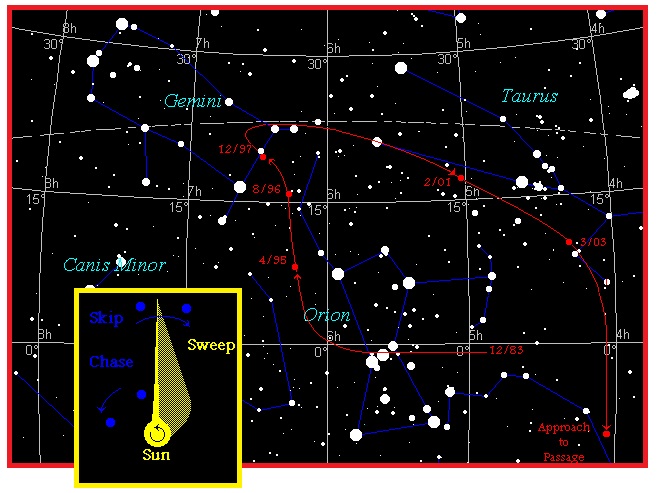
ZetaTalk: Signs
of Change July 2005:
Sling orbit, retrograde
orbit, and retrograde rotation are involved. Nibiru is not
only passing the Sun in a retrograde orbit, it rotates in a
retrograde manner.
ZetaTalk Explanation 2/4/2017: We
stated early in the ZetaTalk saga, even before Nibiru became
visible in observatory sightings in 2001, that it has assumed
a retrograde orbit. It did so to evade what we have called the
Sweeping Arms of the Sun, which reaches out from the Sun as it
rotates in a counterclockwise motion. The Sun rotates in this
direction, and forces all the planets in the inner Solar
System to orbit in this direction. As can be seen by photos of
the Nibiru system, this tail curves out from Nibiru in a
clockwise manner, a retrograde manner, curling under the Sun
and thence up to the left. Nibiru itself also has a retrograde
rotation.
Given the size of the objects in the SDO videos of September 9,
it begs the question – is debris at the end of a Nibiru Moon
Swirl reaching all the way to Earth at the present time? We know
that debris in the vast tail of Nibiru has been arriving, due to
the increased traffic of bolides and fireballs. At first, this
was termed space junk falling back to Earth, or asteroids making
a close pass, or were often claimed to be meteor showers out of
season. But the bolide that was shot down over Chelyabinsk
in 2013 shows how big and dangerous this Nibiru tail
debris can be.
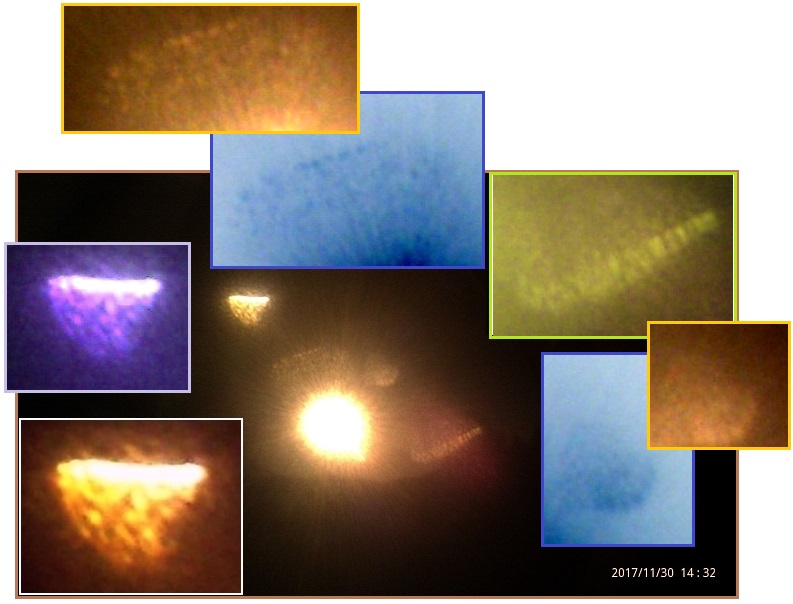
ZetaTalk Explanation 2/20/2010: The
tail of Nibiru is composed of dozens of moons the size of the
Earth's Moon, much debris, and charged red dust. Depending
upon the angle, sunlight can blaze off a portion of the dust
cloud around a Moon Swirl, so it looks like a spash of light
with a drifting tail. Or it can blaze off the individual moons
in a swirl, each surrounded by its own dust cloud, so it
appears as a String of Pearls. Or under close inspection, the
individual moons may be visible.
One particular Moon Swirl, dubbed the Check
Mark, shows the length of an individual Moon Swirl in
comparison to the size of the Sun. How long is this length? The
Earth is 93 million miles from the Sun. Venus is about 67
million miles from the Sun. And the Zetas have stated that the
large moons of Nibiru, those equivalent to the size of the
Earth’s Moon, will be no further than 5 million miles from
Nibiru at any time. But minor moons, and large debris, can be
afar within the vast tail of Nibiru, which is already dropping
red dust on the Earth.
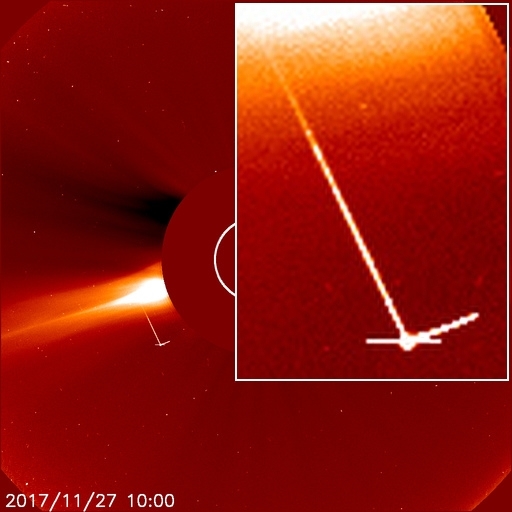
ZetaTalk Explanation 1/2/2010: We
have explained that the tail is vast, the Moon swirls swinging
to either side of Nibiru by 5 million miles, but the tail
itself swings further than that. During the hour of the pole
shift, when Planet X is a mere 14 million miles from the
Earth, the tail is whipping the Earth, depositing hail and red
dust.
ZetaTalk Explanation 2/20/2010: The
L shape, sometimes with addition lines coming from the central
point of juncture, is due to minor swirls stemming from a
single large Moon. These swirls are within a charged dust
cloud, and when the charge differs, they attempt to stand away
from each other, as static will make your hair stand on end
and separate.
The objects eclipsing the Sun on September 9 were not Nibiru’s
primary Moons, the size of Earth’s Moon, but minor moons or
debris the size of large asteroids, swirling in a retrograde
manner due to being caught within the vast tail of Nibiru. Thus
the constant worry in the establishment about asteroid defense,
and the claims that Near Earth Orbit
asteroids are on the increase. Were we warned on September
7-9 that such a swarm of asteroids was close to Earth?
Apparently, if associated with the Nibiru cover-up, mums the
word!
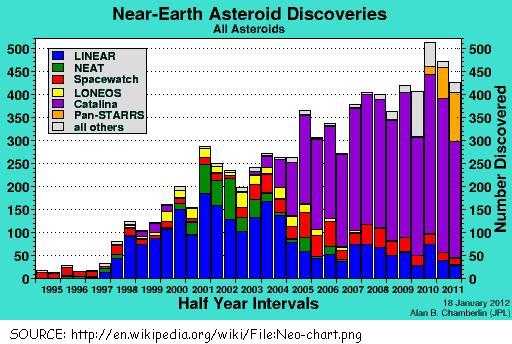
ZetaTalk Prediction 11/14/2009: We
have often stated that the debris in Nibiru, the moon swirls,
are likely to be called an asteroid swarm when they become
noticed. They are getting the public ready for such an excuse.
BATSRUS Reveals
The tail of Nibiru is vast, reaching through the inner Solar
System to waft across the Earth during Nibiru’s approach for a
passage. It is a charged tail, as Nibiru is a big magnet, 23
times as massive as the Earth though only 4-5 times the diameter
of Earth. During its passage through the Asteroid Belt in the
past, Nibiru picked up red iron ore dust from the many small
planets that had been smashed to pieces during Nibiru’s many
passages in that region. Iron is magnetic, and the red dust was
thus attracted to Nibiru, and follows it still.

A Pole
Shift ning blog dedicated to tracking magnetic modeling of
the Earth’s magnetic field shows how this magnetic blast from
Nibiru is affecting the Earth’s magnetosphere. At first,
occasional blasts were being shown on the model. Then eddy flows
curling behind the Earth were shown. Then severe deforming of
the magnetosphere appeared. This was reported in Issue
547 of this Newsletter in March, 2017, and in Issue
538 in January, 2017 and in Issue
526 in October, 2016. Check out the graphic charts!
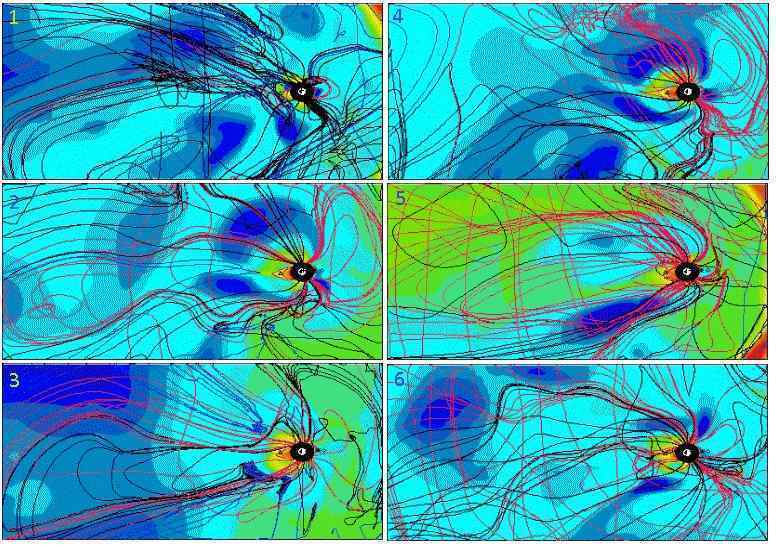
The establishment tried, once before, to blind the public by not
allowing them access to modeling charts of the magnetosphere. In
2012 the modeling site in Japan was
taken down, supposedly for lack of funding, with this function
then taken over by BATSRUS under the control of the US
government. The Japan site was showing
too much, even the location of Nibiru just slightly below
the ecliptic where it rides during its approach for a passage.
In 2008 this breach in the Earth’s magnetosphere was shown to be
exactly 4X the diameter of Earth,
just the size that Nibiru represents. Thus, Japan had to go.
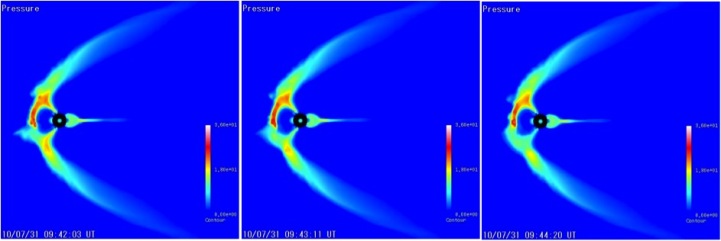
ZetaTalk Explanation 8/7/2010: What
you see here is that portion of the bowshock that represents
the area just beneath the Sun's Ecliptic deforming. This area
currently deforming is the same area called to attention on
December 16, 2008 when a hole in the Earth's magnetosphere, 4
times the size of Earth, was noticed by the THEMIS spacecraft.
Of course, Planet X is 4 times the diameter of Earth.
BATSRUS has outages, timed to blind the public, as has been
documented on the Pole
Shift ning blog dedicated to tracking the coverup. Note
the relationship in dates to the waft of debris at the end of a
Moon Swirl near Earth causing the SDO panic and the solar
observatory closures. There is it, September 5-12, missing data!
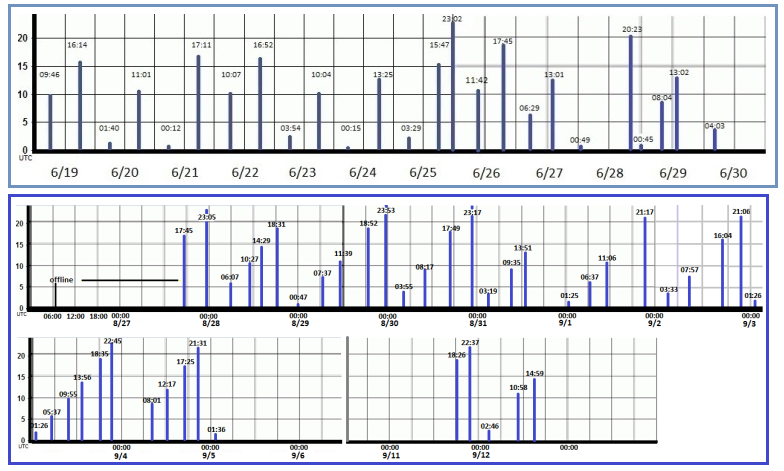
- The Magnetosphere Cygnets again
showing signs of missing frames. Having noticed this back
in June, I started to log the time of events. Though we
may not see the images we can surely note the times. I
made these charts showing the number and time of day (UTC)
of missing frames.
But the Schuman
Resonance shows a mega spike on that day, September 9.
Thus we can conclude that when the magnetosphere is being
hammered, that BATSRUS will try to hide this. The Schuman
Resonance was covered just last week, in Issue
624 showing a mighty spike on September 8. But during the
day of the Nibiru tail swat on September 9, it really spiked! A
continuous slam. Apparently, as long as the cover-up over Nibiru
continues, we can expect solar observatories to be closed, and
the public blinded to the assault on the magnetosphere too.
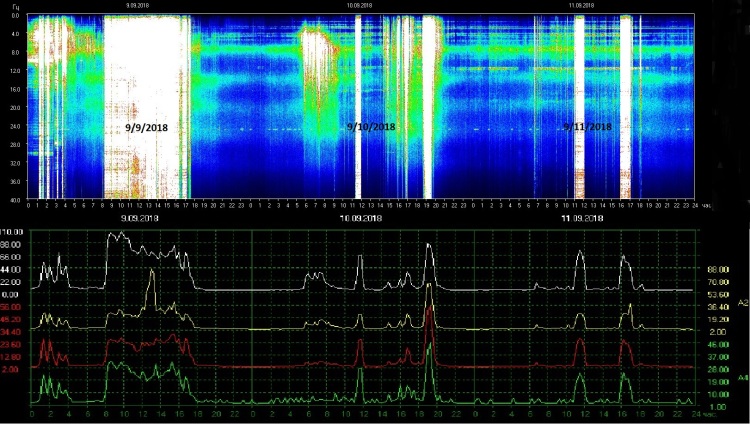
Wobble Moments
The Earth wobble forms a Figure 8, daily, when viewed from
above the Earth’s N Pole. First the Earth’s magnetic N Pole is
pushed away in a Polar Push when the Sun is high over the
Pacific. The N Pole, located in Siberia, comes up over the
horizon at that time to encounter the magnetic push from the N
Pole of Nibiru. Then the Figure 8 swings to the East, when the
Sun is over India, then to the West when the Sun is over Italy,
then when the Sun is over the Americas, there is a bounce back,
a recovery from the Polar Push.
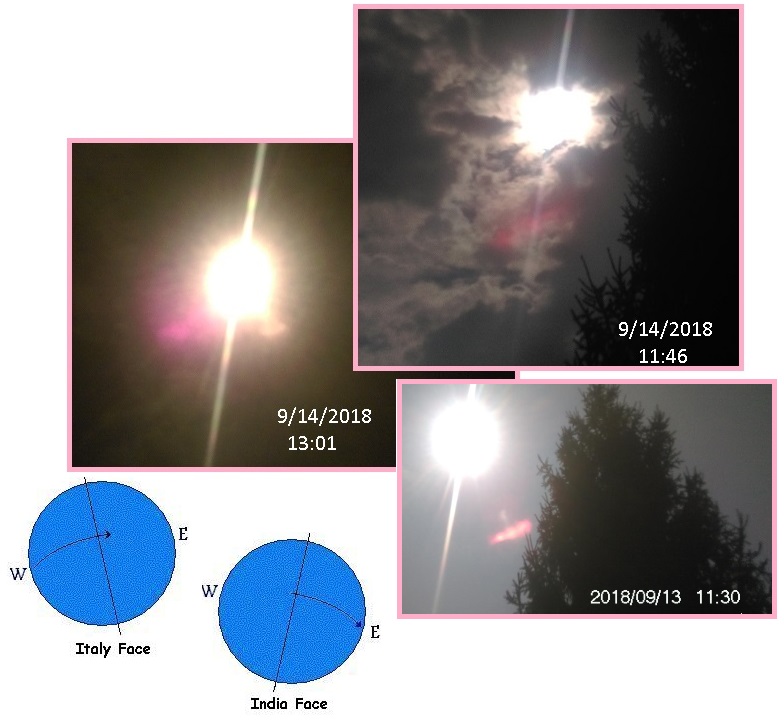
Many have observed that the wobble in each of these directions
can happen quickly, within minutes. Here in Alberto’s photo, the
wobble to the lean to the West happens within an hour and a
half. At 11:30 am on September 13 Nibiru is at the 4 o'clock
position to the Sun, its traditional location in the view from
the Northern Hemisphere. On September 14, the next day, we see
that at 11:46 am the location of Nibiru has moved left
to the 6 o’clock position to the Sun as the lean to the West has
started. Then at 1:01 pm it is at the 7 o'clock position to the
Sun! In an hour and a half, the wobble flopped.
|

